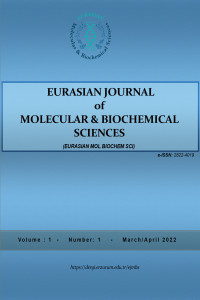The Effects of Quercetin Administration on Heart Tissue and Serum Parameters in the Rats with Experimental Obesity
The Effects of Quercetin Administration on Heart Tissue and Serum Parameters in the Rats with Experimental Obesity
Obesity causes structural and functional damage to various organs. Quercetin is a flavonoid and has potent antioxidant, antiapoptotic and anti-inflammatory effects in the body cells. This study aims to investigate the therapeutic effect of Quercetin on
the cardiac effect caused by obesity in rats with experimental obesity using biochemical and histological methods. In this study,
24 male Sprague Dawley rats were used. The rats were divided into three groups i.e., control, obese, and Quercetin-Obese. A
high-fat diet was administrated to the obese groups for 3 months, the other groups were fed with normal pellet forage. After
the formation of obesity, a 50 mg/kg dose of Quercetin was orally fed to the quercetin-obese and quercetin groups for 15 days.
At the end of study, all the animals were sacrificed by taking blood under anesthesia (sevoflurane), and their heart tissues were
taken. In the obtained serum samples, the levels of triglyceride (TG), cholesterol (CHOL), high-density lipoprotein cholesterol
(HDL-C), low-density lipoprotein cholesterol (LDL-C), and cardiac troponin-I (cTnI) were measured by the auto-analyzer
device. The heart tissues were stained with Bax and Bcl-2 antibodies as immuno-histochemical. When the results of the analysis
were compared among the control and other groups, it was shown that obesity increased the levels of serum TG, CHOL, LDLC, and cTnI whereas quercetin administration had a decreasing effect on these parameters (P
Keywords:
Obesity, Quercetin, Heart, Cholesterol, Apoptosis,
- Başlangıç: 2022
- Yayıncı: Erzurum Teknik Üniversitesi
Sayıdaki Diğer Makaleler
Şimal TOPÇU, Elif ARSLAN, Şeymanur ÇOBANOĞLU, Ayşenur YAZICI, Ümit İNCEKARA
Cihan GÜR, Seçkin ÖZKANLAR, Semin GEDİKLİ, Emin ŞENGÜL, Volkan GELEN, Adem KARA
Investigation of the effects of different genotypes on regeneration capacity in Triticale
İsmail BEZİRGANOGLU, Serap KARAMAN, Beyza REİSOĞLU, Fatma BÖKE, Büşra YAZICILAR
Effect of Bortezomib administration on autophagic cell death in colorectal cancer cells
Elif ERBAŞ, Nevra AYDEMİR CELEP, Kader ÇİFTÇİ
The potential role of long non-coding RNAs and micro RNAs in insects: From junk to luxury
Insha SHAFİ, Mudasir GANİ, Sadiah SHAFİ, Taskeena HASSAN, Mohd. Ayoub MANTOO, Kamlesh BALİ, Rakesh Kumar GUPTA
